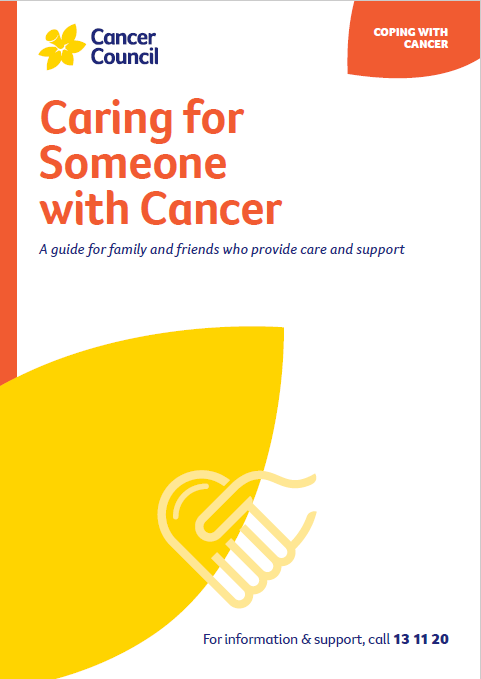- Home
- About Cancer
- Supporting someone with cancer
- Caring for someone with advanced cancer
- What does advanced cancer mean for carers?
What does advanced cancer mean for carers?
Although advanced cancer is unlikely to be cured, it can often be managed, sometimes for years. Even so, caring for someone with advanced cancer can feel overwhelming.
Learn more about:
- When cancer won’t go away
- Avoiding carer burnout
- Discussing prognosis
- Podcast: Caring for Someone with Advanced Cancer
When cancer won’t go away
Some people’s cancer may be at a late stage when they are first diagnosed. For others, the cancer may have spread or come back (recurred) after treatment. Advanced cancer means the cancer is unlikely to be cured, but it can often be controlled for months or, sometimes, years.
Changes to the caring role
Some people live with advanced cancer as a chronic illness for a long time, so there may not be much difference in your caring role immediately. Other people may feel very unwell, so your responsibilities as a carer are likely to increase and may become more complex almost overnight. This may give you little time to adjust to the new situation.
How you might feel – Caring for someone with advanced cancer can feel overwhelming. You may be trying to support the person, while coming to terms with the diagnosis yourself. You may be experiencing a range of strong emotions such as denial, fear, anger, sadnessand grief. A diagnosis of advanced cancer also means living with uncertainty about what lies ahead, and this can be challenging.
Family and friends – As well as having to manage your own emotions, you may also have to tell other family members and friends. This can be time-consuming and difficult, and their reactions may add to your distress. Use text messages, email, blogs or social media, or write one letter and send copies to people. If you need support, talk to your GP or a hospital social worker, or call Cancer Council 13 11 20.
For more on this, see Living with advanced cancer, Palliative care, Facing end of life, and listen to our podcast series The Thing About Advanced Cancer.
Palliative Care Australia also has a range of useful resources.
Avoiding carer burnout
Being a carer for someone with advanced cancer can be physically and emotionally demanding.
Now more than ever, it is important to look after your own wellbeing (see some tips in Caring for yourself).
Stress or distress that lasts a long time can lead to burnout. This can affect your mind and body. See this list of symptoms. If you are experiencing mood swings, irritability, sleep problems, changes in appetite, overwhelming fatigue or other signs of stress for more than 2 weeks, or if you are relying on alcohol or other drugs, talk to your GP or a social worker on the palliative care team
Discussing prognosis
After a diagnosis of advanced cancer, some people want to know how long they have left to live. Others prefer not to know. It’s a very personal decision.
If the person you are caring for prefers not to know, you may still want some idea of what to expect. This can help you understand what is happening and prepare for the changes. You can ask the person if they will give their treatment team permission to speak to you alone.
The health professionals may give you a general idea of the person’s life expectancy. This is known as the prognosis and it is likely to sound a bit vague.
They will probably talk about the time in terms of days, days to weeks, weeks to months, or months to years. The actual time could be shorter or longer, because each individual responds differently to treatment.
Podcast: Caring for Someone with Advanced Cancer
Listen to more of our podcast for people affected by advanced cancer
More resources
Dr Alison White, Palliative Medicine Specialist, Royal Perth Hospital, WA; Tracey Bilson, Consumer; Louise Dillon, Consumer; Louise Durham, Nurse Practitioner, Palliative Care Outpatients, Princess Alexandra Hospital, QLD; Katrina Elias, Carers Program, South Western Sydney Local Health District, NSW Health, NSW; Jessica Elliott, Social Worker, Youth Cancer Services, Crown Princess Mary Cancer Centre, Westmead Hospital, NSW; Brendan Myhill, Social Worker and Bereavement Research Officer, Concord Repatriation General Hospital, NSW; Penny Neller, Project Coordinator, National Palliative Care Projects, Australian Centre for Health Law Research, Queensland University of Technology, QLD; Olivia Palac, Acting Assistant Director, Occupational Therapy, Gold Coast University Hospital, QLD; Nicole Rampton, Advanced Occupational Therapist, Cancer Services, Gold Coast University Hospital, QLD; Shirley Roberts, Nurse Consultant, Medical Oncology, Northern Adelaide Cancer Centre, SA; Dr Elysia Thornton-Benko, Specialist General Practitioner, and UNSW Research Fellow, NSW; Kathleen Wilkins, Consumer; Helen Zahra, Carers Program, South Western Sydney Local Health District, NSW Health, NSW.
View the Cancer Council NSW editorial policy.
View all publications or call 13 11 20 for free printed copies.

